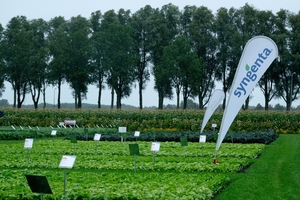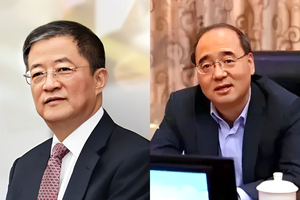In Depth: Rough Market Doomed Syngenta Listing Plans
Listen to the full version
Chinese-owned pesticides and seeds giant Syngenta Group Co. Ltd. had spent three years talking a big game about an imminent IPO. Then on March 29, news broke that it had quietly shelved plans to list. Confirmation from the group came shortly after.
The decision to pull what was slated to be a 65-billion-yuan ($8.96 billion) float was made after “careful consideration of industry environment and the company’s own development strategy,” Syngenta said in a statement that day.

Download our app to receive breaking news alerts and read the news on the go.
Get our weekly free Must-Read newsletter.
- DIGEST HUB
- Syngenta Group shelved its $8.96 billion IPO after evaluating market conditions and its strategies.
- The decision followed a challenging year, with heavy debt from ChemChina’s $43 billion acquisition and underperformance in the agtech sector.
- Ongoing scrutiny from Chinese regulators and shifting management roles, compounded by slow progress in China’s GMO seed market, influenced the move.
Syngenta Group Co. Ltd., owned by Chinese corporation ChemChina, had been gearing up for an Initial Public Offering (IPO) for three years but abruptly decided to shelve the plan in March 2024. [para. 1] This decision was attributed to a careful evaluation of the industry environment and the company’s development strategy. [para. 2] This news surprised many observers, especially since ChemChina acquired Syngenta for $43 billion in 2017, the largest overseas purchase by a Chinese firm to date. This acquisition aimed to mitigate ChemChina's debt through Syngenta's eventual listing on a Chinese mainland bourse. [para. 3][para. 4]
One primary reason for halting the IPO is the rough year for the agtech sector, compounded by Syngenta's poor profitability. The company foresaw regulatory disapproval due to market conditions and its weak financial results. [para. 5][para. 6] Additionally, a corruption investigation into former ChemChina executives related to an unrelated 2014 loan guarantee further complicated matters. [para. 7]
Syngenta's relisting efforts have faced several setbacks since its privatization by ChemChina, with delays and withdrawals from potential listings on the Shanghai main board and the STAR Market. [para. 9][para. 10] The 2021 merger of ChemChina and Sinochem Group formed Sinochem Holdings Corp. Ltd., consolidating several agricultural businesses under Syngenta Group. Despite these efforts, Syngenta's ongoing financial challenges have prevented meeting regulatory requirements for an IPO. [para. 11][para. 14]
Syngenta has struggled with poor market conditions and a high-debt structure, with substantial debts from the ChemChina acquisition in 2017. By September 2023, the company’s debt-to-asset ratio reached 60%. Rising interest rates worsened its financial situation, leading to significant losses despite some revenue growth. [para. 15][para. 16][para. 17] The industry saw significant growth between 2019 and 2022 due to global events like the Russia-Ukraine conflict, but Syngenta's market downturn followed as distributors offloaded stocked supplies. [para. 19][para. 20]
Syngenta’s planned IPO, involving 65 billion yuan, would have been one of China's largest ever, but concerns about its potential impact on the A-share market led to hesitations from stock investors and the regulatory authorities. [para. 23][para. 24] The company's withdrawn IPO plan is emblematic of broader issues within China's IPO markets, which have seen a decline in successful new listings due to increased scrutiny from regulators. [para. 25]
Internal management changes and questions about the firm’s control have also surfaced as Syngenta went through several rounds of top management reshuffles and faced an intense review process for a listing in 2021. The Chinese regulators questioned the control Sinochem had over Syngenta after the merger. [para. 27]
In addition to financial and regulatory challenges, ChemChina's premium paid for Syngenta was a significant bet on the future liberalization of China’s genetically-modified seed market, which has progressed more slowly than anticipated. The lag in policy support and consumer fears over genetically-modified products have delayed expected growth. [para. 33][para. 34]
Overall, while Syngenta stands as a prominent player in the global agrichemical market, its future growth may depend on breaking into new market segments and adapting to regulatory and market conditions in China and globally. [para. 35]
- China National Chemical Corp. Ltd.
- China National Chemical Corp. Ltd. (ChemChina) is a state-owned chemical giant that acquired Syngenta Group Co. Ltd. for $43 billion in 2017, making it the largest overseas purchase by a Chinese company. The acquisition was financed mainly through loans. ChemChina merged with Sinochem Group Co. Ltd. in 2021, forming Sinochem Holdings Corp. Ltd. The company has faced challenges, including a corruption investigation into former executives and difficulties in floating an IPO for Syngenta.
- Syngenta Group Co. Ltd.
- Syngenta Group Co. Ltd. is a Chinese-owned agtech firm headquartered in Basel, Switzerland, acquired by ChemChina in 2017 for $43 billion. It faced delays in its IPO plans, citing market conditions and profitability concerns. The company's growth was hampered by high debts, rising interest rates, and regulatory challenges in the agrichemical sector. Syngenta's revenue grew significantly until 2022 but saw declines in 2023 due to industry downturns and environmental regulations.
- Syngenta AG
- Syngenta AG is a Swiss-based agricultural technology company specializing in pesticides, herbicides, fungicides, and seeds. Acquired by China National Chemical Corp. Ltd. (ChemChina) in 2017 for $43 billion, it delisted from Swiss and U.S. boards. The company has experienced financial difficulties and market conditions have hindered its plans for an IPO. Despite being a significant player, especially in crop protection, it faces challenges like high debt and regulatory hurdles in China's genetically-modified seed market.
- Sinochem Group Co. Ltd.
- Sinochem Group Co. Ltd. merged with China National Chemical Corp. Ltd. (ChemChina) in 2021, creating Sinochem Holdings Corp. Ltd., which is wholly owned by the State-owned Assets Supervision and Administration Commission of the State Council. The merger integrated several large agrochemical businesses, forming the Syngenta Group. Sinochem Holdings controls Syngenta, which includes major stakes in entities like Swiss Syngenta, Adama Ltd., Jiangsu Yangnong Chemical Co. Ltd., and Sinofert Holdings Ltd.
- Sinochem Holdings Corp. Ltd.
- Sinochem Holdings Corp. Ltd. was created in 2021 through the merger of ChemChina and Sinochem Group Co. Ltd. It is wholly owned by the State-owned Assets Supervision and Administration Commission of the State Council, China’s cabinet. This merger integrated multiple large agrochemical businesses, including full stakes in Syngenta, Adama Ltd., Jiangsu Yangnong Chemical Co. Ltd., and Sinofert Holdings Ltd., into Syngenta Group, which is fully controlled by Sinochem Holdings.
- Adama Ltd.
- Adama Ltd. is a producer of herbicides and insecticides, fully owned by Syngenta Group under Sinochem Holdings Corp. Ltd. It is listed on the Shenzhen Stock Exchange with the ticker 000553.SZ.
- Jiangsu Yangnong Chemical Co. Ltd.
- Jiangsu Yangnong Chemical Co. Ltd. is an agrochemical company that was integrated into Syngenta Group under Sinochem Holdings Corp. Ltd after ChemChina's merger with Sinochem Group. The firm specializes in producing pesticides, herbicides, and insecticides and is listed on the Shanghai Stock Exchange with the ticker 600486.SH.
- Sinofert Holdings Ltd.
- Sinofert Holdings Ltd. is one of the large agrochemical businesses integrated into Syngenta Group after ChemChina merged with Sinochem Group in 2021, forming Sinochem Holdings Corp. Ltd. The entity is fully controlled by the new Sinochem Holdings, which oversees Syngenta Group.
- Bank of Gansu Co. Ltd.
- Bank of Gansu Co. Ltd. granted loans totaling 2.5 billion yuan to Gansu Tianji Investment Management Co. Ltd., which ChemChina guaranteed but were never repaid. Consequently, ChemChina was found liable for repaying these loans, leading to approximately 3 billion yuan in losses for ChemChina.
- Gansu Tianji Investment Management Co. Ltd.
- Gansu Tianji Investment Management Co. Ltd. is a private enterprise based in Northwest China’s Gansu province. In 2014, it received loans totaling 2.5 billion yuan from Bank of Gansu Co. Ltd., with ChemChina acting as a guarantor. The loans were never repaid, leading to a court ruling in 2022 that made ChemChina liable for the debt, resulting in approximately 3 billion yuan in losses for ChemChina.
- 2017:
- China National Chemical Corp. Ltd. (ChemChina) acquired Syngenta Group Co. Ltd. for $43 billion.
- June 2021:
- ChemChina merged with Sinochem Group Co. Ltd., creating Sinochem Holdings Corp. Ltd.
- June 2021:
- Qin Hengde was appointed as president of Syngenta's China business.
- May 2023:
- Syngenta withdrew an application to list on Shanghai's STAR Market.
- By September 2023:
- Syngenta's debt-to-asset ratio reached 60%.
- October 2023:
- Another management reshuffle at Syngenta occurred, appointing Qin Hengde as CFO and Jeff Rowe as CEO.
- November 6, 2023:
- Syngenta's booth was displayed in Shanghai.
- November 2023:
- The plan to list Syngenta on Shanghai's main board was delayed due to volatile market conditions.
- End of 2023:
- China started to allow genetically-modified seeds.
- By the first quarter of 2024:
- Only 30 new stocks listed on mainland markets, raising a total of 23.6 billion yuan.
- March 29, 2024:
- News broke that Syngenta had quietly shelved plans to list, with confirmation from the group following shortly after.
- GALLERY
- PODCAST
- MOST POPULAR







 Sign in with Google
Sign in with Google
 Sign in with Facebook
Sign in with Facebook
 Sign in with 财新
Sign in with 财新